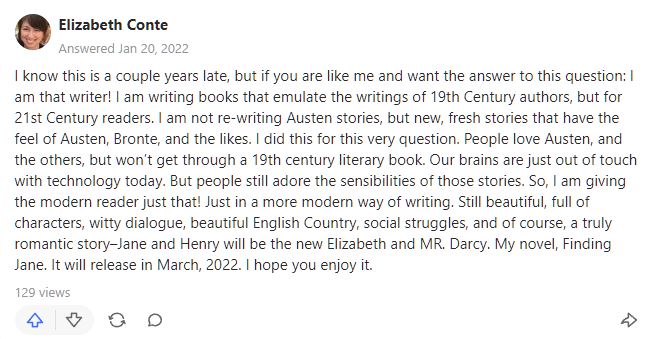New “I’m Not Like Other Girls” Romance Author Just Dropped & This Time She’s Got More to Sell Than a Debut Book

A profile of author Elizabeth Conte for the Daily Pilot (under the L.A. Times) has romance readers upset because, in her attempt to claim the already existing (and controversial) genre of literary romance as her own and pitch a half-baked publishing house, Conte put down millions of readers and writers worldwide—an unfortunately common phenomenon with the genre.
While she acknowledged the success of Brigderton and Downton Abbey, she noted,
There’s all these historical, Old World stories and [people] are just eating it up, but we’re not getting the same thing in books. […] We’re not seeing the same character development, the long-term romances. It’s very ‘wham, bam; thank you ma’am’ romances, not like ‘Pride and Prejudice’ and ‘North and South’ … all these stories they keep redoing [in film].
There’s a reason that certain romances get redone so much in film, and it has more to do with the age of the text, popular media’s aversion to women’s pleasure, and failure to invest in stories of working-class women than an inherent writing quality lost to time. But go off, Conte, and tell me more about what’s not happening in a genre you don’t like.
Jane Austen and “literary romance”
I’m not sure how many people read Conte’s whole profile, which is worse than a quote here or there. The interview starts with reporter Lilly Nguyen describing how much Conte loves 1800s books. Nguyen writes, “She said she loved what that period of literature gives, but also realized that the average reader probably doesn’t chase after authors like Jane Austen and Elizabeth Gaskell.” She didn’t just say this in an interview, but also on Quora, in a way that echoes the interview with the Daily Pilot.

Despite Conte’s book being named Finding Jane, and naming her new publishing house Jane Writes Press, she seems to know very little about the contemporary cultural impact of Austen’s work. The fact that she tried to use Jane Austen as a defense against contemporary romance and a standard shows her cards—especially Pride and Prejudice. For one, Austen is almost like a secular bible to women writing fiction, which certainly extends to romance, rather than some untapped well of inspiration. I personally love it, but I’ll acknowledge it’s almost a writing cliché at this point because Austen’s work is so loved, and she’s one of the few women read in general education.
Just a week ago, I read the webcomic turned non-fiction marriage memoir That Can Be Arranged: A Muslim Love Story by Huda Fahmy. She brought up Austen at least once when comparing courting with a big family of daughters to the Bennett family. Outside of outright bringing Austen up as a source of feeling seen, Austen adaptations (among other literary romance novels) are very popular in adult and YA romance books—which I’d put money on Conte feeling a certain way about.
The concept of “literary romance” already ruffles some feathers because it is seen by some as a sort of way to distance or elevate a romance book, as if romance is otherwise low-brow and shameful. I’m not opening that can of worms. However, it is a basic fact that Elizabeth Conte did not come up with the genre or the phrasing. It’s been around for a while. A fascinating New York Times retrospective on the term put out in February places its origins with Austen herself. Conte’s giving colonizer energy even though she’s doing it against a lot of her own people. Speaking of race, everything she implies is a quality romance is all very white, and that’s a whole separate conversation.
Unoriginal & uninspired
What’s very frustrating and telling is that this profile appeared to be promoting this publishing house that Conte is creating. She talks a lot about how self-published authors (particularly women and marginalized people) are looked down upon while failing to realize that the most profitable sector of self-published work is often women writing erotic and romance. Conte told the Daily Pilot, “There’s so many self-published authors out there. The publishing world isn’t satisfying the market and I think that’s what’s really cool about the indie market.” This almost verbatim sounds like it’s coming from the same group of authors she implies don’t have enough drama or aren’t high-brow enough.
Conte brings up no other authors she thinks are doing something similar to her but at least acknowledges they’re out there, so I guess that’s a bit of humility. Still, her publishing company offers no benefits except that it’s associated with her. Authors are expected to do almost all of the backend work like self-published authors (graphic design, marketing, editing, etc.). Editor Rochelle Deans went into some more specific red flags in a recent Medium post.
Instead of reading across the genre to find her people (which is not historical romance, because she said she doesn’t like historical romance), she chose to pitch herself and her brand as a “pick me” alternative. The claim of inventing a genre that’s already in discourse aside, it’s not a good look to try to revolutionize a genre you don’t enjoy.
(via The Daily Pilot (LA Times), featured image: Alex Green via Pexels)
The Mary Sue may earn an affiliate commission on products and services purchased through links.
—The Mary Sue has a strict comment policy that forbids, but is not limited to, personal insults toward anyone, hate speech, and trolling.—
Have a tip we should know? [email protected]
